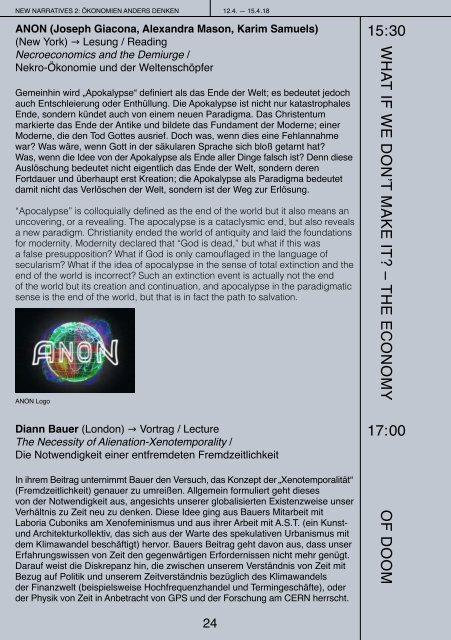RZ_NN2_Heft_A5_kleineDatei_5MB
Create successful ePaper yourself
Turn your PDF publications into a flip-book with our unique Google optimized e-Paper software.
NEW NARRATIVES 2: ÖKONOMIEN ANDERS DENKEN 12.4. — 15.4.18<br />
ANON (Joseph Giacona, Alexandra Mason, Karim Samuels)<br />
(New York) → Lesung / Reading<br />
Necroeconomics and the Demiurge /<br />
Nekro-Ökonomie und der Weltenschöpfer<br />
Gemeinhin wird „Apokalypse“ definiert als das Ende der Welt; es bedeutet jedoch<br />
auch Entschleierung oder Enthüllung. Die Apokalypse ist nicht nur katastrophales<br />
Ende, sondern kündet auch von einem neuen Paradigma. Das Christentum<br />
markierte das Ende der Antike und bildete das Fundament der Moderne; einer<br />
Moderne, die den Tod Gottes ausrief. Doch was, wenn dies eine Fehlannahme<br />
war? Was wäre, wenn Gott in der säkularen Sprache sich bloß getarnt hat?<br />
Was, wenn die Idee von der Apokalypse als Ende aller Dinge falsch ist? Denn diese<br />
Auslöschung bedeutet nicht eigentlich das Ende der Welt, sondern deren<br />
Fortdauer und überhaupt erst Kreation; die Apokalypse als Paradigma bedeutet<br />
damit nicht das Verlöschen der Welt, sondern ist der Weg zur Erlösung.<br />
“Apocalypse” is colloquially defined as the end of the world but it also means an<br />
uncovering, or a revealing. The apocalypse is a cataclysmic end, but also reveals<br />
a new paradigm. Christianity ended the world of antiquity and laid the foundations<br />
for modernity. Modernity declared that “God is dead,” but what if this was<br />
a false presupposition? What if God is only camouflaged in the language of<br />
secularism? What if the idea of apocalypse in the sense of total extinction and the<br />
end of the world is incorrect? Such an extinction event is actually not the end<br />
of the world but its creation and continuation, and apocalypse in the paradigmatic<br />
sense is the end of the world, but that is in fact the path to salvation.<br />
ANON Logo<br />
Diann Bauer (London) → Vortrag / Lecture<br />
The Necessity of Alienation-Xenotemporality /<br />
Die Notwendigkeit einer entfremdeten Fremdzeitlichkeit<br />
In ihrem Beitrag unternimmt Bauer den Versuch, das Konzept der „Xenotemporalität“<br />
(Fremdzeitlichkeit) genauer zu umreißen. Allgemein formuliert geht dieses<br />
von der Notwendigkeit aus, angesichts unserer globalisierten Existenzweise unser<br />
Verhältnis zu Zeit neu zu denken. Diese Idee ging aus Bauers Mitarbeit mit<br />
Laboria Cuboniks am Xenofeminismus und aus ihrer Arbeit mit A.S.T. (ein Kunstund<br />
Architekturkollektiv, das sich aus der Warte des spekulativen Urbanismus mit<br />
dem Klimawandel beschäftigt) hervor. Bauers Beitrag geht davon aus, dass unser<br />
Erfahrungswissen von Zeit den gegenwärtigen Erfordernissen nicht mehr genügt.<br />
Darauf weist die Diskrepanz hin, die zwischen unserem Verständnis von Zeit mit<br />
Bezug auf Politik und unserem Zeitverständnis bezüglich des Klimawandels<br />
der Finanzwelt (beispielsweise Hochfrequenzhandel und Termingeschäfte), oder<br />
der Physik von Zeit in Anbetracht von GPS und der Forschung am CERN herrscht.<br />
24<br />
15:30<br />
WHAT IF WE DON’T MAKE IT? – THE ECONOMY OF DOOM<br />
17:00<br />
NEW NARRATIVES 2: THINKING ECONOMICS DIFFERENTLY<br />
Es gibt eine Kluft zwischen unserem evolutionären, durch Erfahrung vermittelten<br />
Verständnis von Zeit und unserem Vermögen, sie in unwahrnehmbar großen<br />
oder kleinen Maßstäben zu begreifen. Die Effekte des globalen Klimawandels<br />
nötigen uns die Frage im Titel dieser Veranstaltung auf – Was, wenn wir’s nicht<br />
schaffen? –, und zwar nicht als nihilistische Fantasie, sondern als eine reale<br />
Zukunftsaussicht. Xenotemporalität möchte aber, dass wir nicht allzu duldsam<br />
in die anbrechende Nacht eintreten… Doch nicht im Zorn stellen wir uns dem<br />
Verlöschen des Lichts, sondern bedächtig, mit Vernunft und voller List.<br />
In this lecture Bauer will begin to sketch out the idea of Xenotemporality, which<br />
broadly proposes a need to rethink our relationship to time in the light of how we<br />
function as a global species.The idea is developed out of her work as part of<br />
Laboria Cuboniks/Xenofeminism and her workas part of A.S.T. (an art/architecture<br />
collective working on speculative urbanism in relation to global climate change).<br />
The paper proposes that our experiential understanding of time is insufficient<br />
for our current needs. This is evidenced by things like the discrepancy between<br />
how we function in relationship to time for the purposes of politics vs. time in<br />
relationship to climate change, how time functions for finance (high-speed<br />
trading and futures markets for example) and the physics of time with regard to<br />
GPS and work done at CERN. There is a spilt between our evolutionary experiential<br />
understanding of time and our capacity to understand it on imperceptible<br />
scales (either too big or too small). Realities of global climate change present us<br />
with the need to entertain the questions of the session, What If We Don’t Make It?<br />
as a real prospect rather than nihilistic fantasy, but Xenotemporality invites us to<br />
not go gentle into that good night…though it is not through rage that we thwart off<br />
the dying of the light but rather though deliberation, reason, and cunning.<br />
Diann Bauer, Inverse Condo Bend, © A.S.T. (Alliance of the Southern Triangle), 2018<br />
25<br />
FREITAG / FRIDAY


